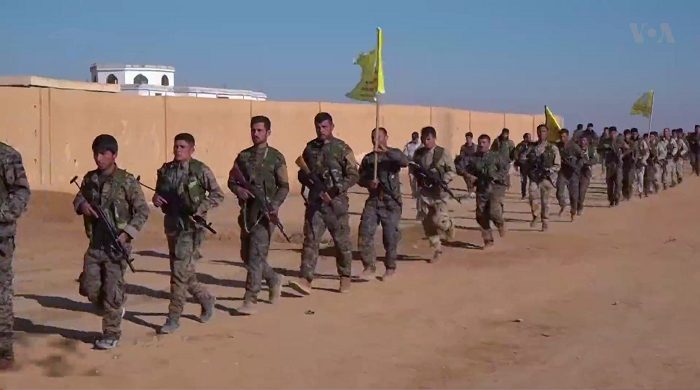Publications
INSS Insight No. 1929, January 1, 2025
Now that the Bashar al-Assad regime has fallen, Turkey is threatening the continued existence of the Kurdish-dominated autonomous administration in northeastern Syria. This development creates a number of dilemmas for Israel. First, the question arises as to what will happen if the United States decides to withdraw its forces from northeastern Syria. Second, given the great influence that Turkey is expected to exert in Syria in the post-Assad era, substantial Israeli support for the Kurdish struggle could lead to an undesirable consequence of a Turkish military presence in southern Syria—a region in which Israel has a special interest. Finally, internal divisions among the Kurds and the fact that Israel has traditionally supported a Kurdish political party in northern Iraq that opposes the activity of the Kurdish underground raise doubts about whether Israel should support the Syrian branch of the Kurdish underground that dominates northeastern Syria.
The overthrow of the Bashar al-Assad regime by the rebel forces in Syria has rocked that country and has led the Autonomous Administration of North and East Syria (AANES), which is dominated by the Kurds—particularly the Democratic Union Party (PYD), the Syrian branch of the Kurdistan Workers’ Party (PKK) underground—to declare a state of emergency.[1] Since the fall of the Assad regime, clashes have occurred in northern Syria, especially west of the Euphrates River, between the Syrian National Army (SNA), a Turkish-sponsored collection of militias, and the Syrian Democratic Forces (SDF), a US-supported militia comprised of Arabs, Kurds, and other minorities, although its command is dominated by PYD military forces. A concentration of Turkish forces has also been reported near the city of Kobane, close to the Turkish border. Kobane, with its Kurdish majority, has great symbolic importance for the Kurds because of their victory there over the Islamic State in 2014–2015. Commenting on developments in northeastern Syria, Turkish Foreign Minister Hakan Fidan stated that the entire military leadership of the Kurdish underground’s Syrian branch, which includes Turkish and Iranian Kurds, must leave Syria, along with the Syrian commanders. In response, SDF commander in chief Mazloum Abdi expressed his willingness to demilitarize Kobane under the supervision of US military patrols.
Many regard Assad’s overthrow as a tremendous achievement for Turkey, which stood out in its opposition to the Assad regime and armed the organizations rebelling against him. However, the Turkish government’s policy toward Syria is complex because it also involves Turkey’s approach to its Kurdish minority, which constitutes about a fifth of the country’s population. Before Assad was defeated, attempts to renew a dialogue with PKK leader Abdullah Öcalan, currently held in solitary confinement in Turkey, had begun. The Turkish government believes that weakening the PYD in northeast Syria could diminish the PKK’s bargaining power. It seems that Turkey is strongly tempted to act—either indirectly through the SNA or directly via a Turkish military operation—to roll back the gains achieved by the Kurds since the outbreak of the Syrian civil war, particularly as those gains are perceived by the West as the result of the SDF’s contribution to the territorial defeat of the Islamic State.
Turkey has already conducted three military operations against the Kurds in northern Syria in 2016–2019, and areas taken over by Turkey have undergone a process of “Turkification.” The presence of most of Syria’s oil reserves within the territory of the AANES is also likely to boost Turkey’s incentive to act against the Kurds and help consolidate a central government in Syria in the post-Assad era. At the same time, some Arab groups have already begun defecting from the SDF, which will weaken this force, as it is estimated that over half of the SDF’s 100,000 fighters are not Kurdish.
The Developments in Northeastern Syria Have Created Three Dilemmas for Israel
The first dilemma concerns the question of whether the presence of approximately 2,000 American soldiers in Syria will continue. It is in Israel’s interest for the American forces to remain in Syria, partly because they have helped to sever the Iranian land bridge through Iraq and Syria to Hezbollah in Lebanon. Despite their small numbers, these forces have been effective in maintaining stability in their areas of deployment. Nonetheless, the United States also has important interests in the region, including preventing a resurgence of the Islamic State, particularly among those held in detention facilities in the autonomous area of northeastern Syria, and honoring a moral commitment to the SDF, which fought against the Islamic State. There is also bipartisan congressional support for maintaining Kurdish autonomy against Turkish plans for the region. However, during his first term, President Donald Trump came close to withdrawing American forces from Syria, a move averted only after last-minute efforts, including those by the Pentagon. Furthermore, since the fall of Assad, the Americans have been pressuring the PYD to show flexibility vis-à-vis Turkey by relinquishing some of their autonomous rights and even ceding control of territories west of the Euphrates River. This raises a critical question of what Israel should do if the United States decides to withdraw. An American withdrawal would weaken deterrence against Turkey and/or SNA attacks on the Kurds and carry significant operational and symbolic implications. If Israel intends to aid the PYD in such a scenario, it would not be enough to provide only humanitarian aid, as it had assisted certain rebel groups during the Syrian civil war. Hence, it is difficult to believe that Israel will take substantial action if American forces leave Syria.
The second dilemma concerns the relations between Israel and Turkey in light of the developments in Syria. Despite strained relations due to the situation in the Gaza Strip and Turkey’s unequivocal support for Hamas, the events in Syria compel Israel to pay closer attention to Turkey’s position. During the Syrian civil war, Israel’s interests, focused on southern Syria, did not conflict significantly with Turkey’s interests in northern Syria. Turkey’s growing influence throughout Syria, however, is changing this dynamic. Nonetheless, the “balance of interests” remains such that Israel’s focus is mainly on southern Syria, where its primary concerns are defending its borders, preventing infiltration by hostile forces, and blocking Iranian weapons shipments to Hezbollah via Syria. As the SDF will likely require substantial support in the near future, Israeli assistance to the SDF would be seen by Turkey as a major shift in Israel’s policy, warranting careful consideration of the implications of such a decision.

It should be noted in this context that Turkey has strongly opposed American support for the PYD, despite attempts to downplay it by establishing the SDF, which includes Arab forces. This opposition has contributed to the growing tension in Turkish–American relations since the Obama administration. Considering the dialogue that Israel will likely need to hold with Turkey regarding the future Syrian state, any Israeli challenge to Turkey’s interests in northern Syria could increase the likelihood of Turkish forces deploying in southern Syria. Turkey could justify this on the pretext of defending Syrian sovereignty and supporting the Syrian army, which is expected to reorganize and will receive equipment from Turkey’s defense industry.
The third dilemma concerns internal divisions among the Kurds—a minority group spread across Turkey, Iraq, Iran, and Syria—and their implications for Israeli policy. Israel has traditionally supported the Kurdistan Democratic Party (KDP) in northern Iraq, which has tense relations with both the PKK and the PYD. Turkey has pressured the KDP to refrain from supporting the PYD and instead back the Kurdish National Council (KNC) in Syria, a coalition of Kurdish groups that are not connected to the PYD. While the KDP has struggled to strengthen the KNC, recent developments and US pressure on the PYD to adopt a more conciliatory stance could bolster the KDP’s efforts. Israeli support for the PYD would likely increase Turkish pressure on the KDP, and Israel should remain attentive to this dynamic, given its interest in preserving its relationship with the KDP in northern Iraq, which has significant influence there.
Regardless of Israeli policy, Turkey has already accused Israel of supporting the PYD and the PKK in order to harm Turkey. At the same time, there is a difference between conspiracy theories, even if they are prevalent among the public and government officials, and the confirmation of certain dimensions of such theories, which could force Ankara to pursue a different policy vis-à-vis Israel. It is also worth noting that, while some Israeli politicians have occasionally expressed support for Kurdish independence—particularly toward the 2017 referendum in northern Iraq, which saw widespread support for independence but was followed by a regional blockade and territorial advances by Baghdad—Israel was unable and seemingly unwilling to prevent these outcomes.
Recent Israeli statements supporting the Kurds in Syria, specifically by Foreign Minister Gideon Sa’ar, appear to be aimed at pressuring the United States to maintain its presence in northeastern Syria. However, if the United States ultimately decides to withdraw its forces from there, these statements are likely to amount to little more than rhetoric, and Israel should therefore exercise caution in continuing to issue such declarations. If Israel seeks to support the Kurds in northeastern Syria, it can assist the diplomatic process between the West, Turkey, and the PYD, which will include a dialogue on the level of Kurdish autonomy in Syria in the post-Assad era.
[1] The PKK—the Kurdish underground group classified as a terrorist organization by the United States, the European Union, and others—established its Syrian branch, the PYD, in 2003. When the Syrian civil war erupted, Kurdish forces, led by the PYD, managed to take control of three cantons in northern Syria. They also created territorial continuity between two of the cantons and formed what later became the AANES. However, in 2018, following Operation Olive Branch by the Turkish military, the Kurdish forces lost control of the northwestern canton of Afrin.



